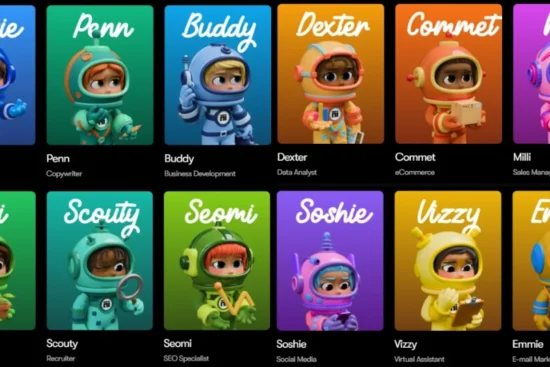
Generative Artificial Intelligence (AI) has emerged as one of the most groundbreaking technological advancements in recent years. It has already begun to transform various industries, and marketing is no exception. With the ability to create content, predict consumer behavior, and automate tasks, generative AI has opened new avenues for marketers to engage with customers. This blog explores how generative AI is revolutionizing marketing strategies, focusing on the powerful role of personalization.
What is Generative AI?
Generative AI refers to a class of AI systems designed to create new, original content by learning from existing data. Unlike traditional AI, which is rule-based and can only perform specific tasks, generative AI can produce creative outputs such as text, images, videos, music, and more. Tools like OpenAI’s GPT-3 and DALL-E are examples of generative AI models that can generate text-based content, while models like Runway and MidJourney create images and videos.
In marketing, generative AI has the potential to enhance personalization, improve customer targeting, and streamline content creation. As businesses seek more effective ways to connect with customers, AI’s ability to generate high-quality, tailored content in real time is becoming invaluable.
The Role of Personalization in Modern Marketing
Personalization has become a key driver in marketing strategies today. Consumers expect brands to understand their unique preferences, habits, and needs, and respond accordingly. According to a report by Epsilon, 80% of consumers are more likely to make a purchase when brands offer personalized experiences. However, achieving true personalization at scale can be a challenge. This is where generative AI can step in.
Generative AI allows brands to move beyond basic personalization tactics like name insertion in emails or targeting based on demographics. Instead, AI-driven tools can craft highly personalized content that resonates with individual customers. By analyzing data from social media interactions, browsing history, past purchases, and other sources, generative AI models can predict customer preferences and generate custom content in real time.
Enhancing Content Creation with Generative AI
Content creation has always been at the heart of digital marketing. Marketers spend considerable time and resources creating engaging content, whether it’s blog posts, social media updates, advertisements, or email campaigns. However, the sheer volume of content needed to maintain a consistent digital presence can be overwhelming.
Generative AI can help streamline this process. With AI tools, marketers can automatically generate high-quality content that is relevant to specific audience segments. For example, AI-powered copywriting tools can craft blog posts or product descriptions based on a few keywords or brief inputs. These tools can also adapt the tone, style, and language to match the brand’s voice and audience’s preferences.
Moreover, AI-generated content can be tailored for different platforms. Whether it’s a short tweet, a long-form article, or an engaging Instagram caption, generative AI can create content in the right format for the right platform. This is particularly important as businesses need to maintain a strong presence across multiple digital channels, each with its own content requirements.
Real-Time Personalization
One of the most exciting benefits of generative AI is its ability to provide real-time personalization. Traditional marketing methods rely on pre-set campaigns, which are often less flexible in responding to shifts in customer preferences or behavior. In contrast, generative AI can analyze data in real time, allowing businesses to adapt their strategies and content on the fly.
For example, an e-commerce website can use AI to generate personalized product recommendations for each visitor based on their browsing history, past purchases, and other behavioral data. If a customer has previously shown interest in fitness equipment, the website can generate personalized recommendations for related products like workout apparel or supplements. These real-time recommendations enhance the customer experience and increase the likelihood of conversions.
Similarly, generative AI can be used to optimize email marketing campaigns. Instead of sending generic, one-size-fits-all messages, AI tools can create dynamic, personalized emails for each recipient. This can include personalized subject lines, product suggestions, and content that speaks directly to the individual’s interests. Real-time personalization leads to higher engagement rates and improved customer satisfaction.
Automating Customer Interactions
Customer service and support have traditionally been resource-intensive tasks for businesses. However, with the advent of generative AI, businesses can now automate many aspects of customer interaction while still maintaining a personal touch. AI chatbots and virtual assistants can engage with customers in real time, answering questions, solving problems, and even completing transactions.
For example, AI-powered chatbots can be programmed to handle customer inquiries and provide personalized responses based on the customer’s previous interactions with the brand. If a customer has asked about a particular product before, the chatbot can recall this information and provide relevant updates or suggestions. Additionally, AI models can handle common questions, reducing the need for human intervention and allowing support teams to focus on more complex issues.
Generative AI also allows businesses to create personalized experiences in other areas, such as advertising. AI can generate tailored ads based on a user’s interests, preferences, and past behaviors. These personalized ads are more likely to capture the attention of potential customers and drive conversions.
Predicting Consumer Behavior
One of the greatest challenges in marketing is predicting consumer behavior accurately. Businesses spend a significant amount of time and resources on market research, attempting to understand what drives their customers to purchase. Generative AI can enhance this process by analyzing vast amounts of data and making predictions based on patterns it identifies.
Generative AI models can predict customer behavior by analyzing factors such as browsing history, purchase patterns, social media activity, and demographic information. By understanding these patterns, AI can forecast what products a customer is likely to be interested in next, when they are likely to make a purchase, and what type of messaging will resonate with them.
This predictive capability can help marketers make more informed decisions about their campaigns. For example, if AI predicts that a customer is likely to buy a specific product in the near future, the marketing team can create targeted ads and promotions to influence that decision. Similarly, predictive AI can help businesses identify high-value customers, allowing them to tailor their outreach and retention strategies accordingly.
Ethical Considerations and Challenges
While the potential of generative AI in marketing is vast, there are several ethical considerations and challenges that businesses must address. One of the key concerns is data privacy. Generative AI relies on large datasets, including personal information, to make accurate predictions and generate personalized content. Companies must ensure that they are using this data responsibly and in compliance with privacy regulations such as GDPR.
Another challenge is the risk of over-reliance on AI. While generative AI can automate many aspects of marketing, human oversight is still necessary to ensure that the generated content is aligned with the brand’s values and messaging. Additionally, AI tools must be regularly monitored to ensure they do not perpetuate biases or generate inappropriate content.
Finally, businesses must be transparent with their customers about the use of AI. Many consumers are wary of AI-driven marketing and may feel uncomfortable with the idea of their personal data being used to generate tailored content. Brands that are transparent about how they use AI and respect customers’ privacy are likely to build trust and foster long-term relationships.
Conclusion
Generative AI is undoubtedly reshaping the marketing landscape. By enabling real-time personalization, automating customer interactions, and predicting consumer behavior, AI is helping businesses connect with their audiences in more meaningful and effective ways. As marketers continue to embrace these technologies, the potential for creating highly personalized and engaging experiences will only grow.
However, while the benefits are clear, marketers must approach the adoption of generative AI with caution, ensuring that they address ethical concerns, data privacy issues, and maintain a balance between automation and human oversight. With the right approach, generative AI can be a powerful tool in creating a new era of marketing that puts the customer at the center of every strategy.












